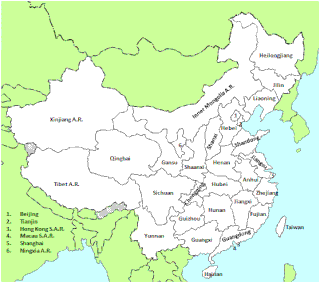
The Legislative Yuan is the unicameral legislature of the Republic of China (Taiwan) located in Taipei. The Legislative Yuan is composed of 113 members, who are directly elected for four-year terms by people of the Taiwan Area through a parallel voting system.

The National Assembly was the authoritative legislative body of the Republic of China, from 1947 to 2005. Along with the Control Yuan and the Legislative Yuan, the National Assembly formed the tricameral parliament of China. If still functional, at 3,045 members, the National Assembly would have been the largest parliamentary chamber in the world.

The Constitution of the Republic of China is the fifth and current constitution of the Republic of China (ROC), ratified by the Kuomintang during the Constituent National Assembly session on 25 December 1946, in Nanjing, and adopted on 25 December 1947. The constitution, along with its Additional Articles, remains effective in ROC-controlled territories.

The Control Yuan is the supervisory and auditory branch of the government of Taiwan.
The Examination Yuan is the civil service commission branch, in charge of validating the qualification of civil servants, of the government of the Republic of China (Taiwan). It has a president, a vice president, and seven to nine members, all of whom are nominated by the president of the republic and confirmed by the Legislative Yuan for four-year terms according to Republic of China laws.

An election for the National Assembly took place in Taiwan on Saturday, 14 May 2005, from 07:30 to 16:00 local time. It elected an ad hoc National Assembly whose only function was to serve as a constituent assembly in order to approve or reject amendments to the Constitution of the Republic of China already proposed by the Legislative Yuan. The results indicated that the amendments would be approved, as the parties supporting them won an overwhelming majority, and indeed the amendments were passed on 7 June 2005.

Tsai Ing-wen is a Taiwanese politician who has been serving as the president of the Republic of China (Taiwan) since 2016. A member of the Democratic Progressive Party (DPP), Tsai is the first female president of Taiwan. She served as chair of the DPP from 2020 to 2022, and also previously from 2008 to 2012 and 2014 to 2018.
Same-sex marriage between citizens became legal in Taiwan on 24 May 2019, making it the first country in Asia to legalize same-sex marriage. Marriages between Taiwanese and foreign citizens were initially restricted to citizens of countries that also recognized same-sex marriage. That limitation was rescinded on 19 January 2023. The one remaining exception is citizens of the People's Republic of China — mainland China — because cross-straits marriages must be registered in mainland China before they can apply in Taiwan.

Lesbian, gay, bisexual and transgender (LGBT) rights in the Republic of China (Taiwan) are regarded as the most progressive of those in Asia. Both male and female same-sex sexual activity are legal, and same-sex marriage was legalized on 24 May 2019, following a Constitutional Court ruling in May 2017. Same-sex couples are able to jointly adopt children since 2023. Discrimination on the basis of sexual orientation, gender identity and gender characteristics in education has been banned nationwide since 2004. With regard to employment, discrimination on the basis of sexual orientation has also been prohibited by law since 2007.

The Economic Cooperation Framework Agreement (ECFA) is a free trade agreement (FTA) between the governments of the People's Republic of China and the Republic of China, that aims to reduce tariffs and commercial barriers between the two sides, as well as improve cross-strait relations.

Kuo Lin-yung, is a Taiwanese politician. During his first term on the Legislative Yuan from 1984 to 1987, he was affiliated with the Kuomintang. He returned to the legislature between 2005 and 2008, representing the Taiwan Solidarity Union. He is also a lawyer who has led the Taichung Bar Association and Taiwan Bar Association, and served as deputy minister of justice. In 2010, he was a member of the Referendum Review Committee convened by the Executive Yuan.

Julian Kuo is a Taiwanese political scientist and politician who first served in the Legislative Yuan from 2002 to 2008 and was reappointed to the office in 2016.
Chung Shao-ho is a Taiwanese politician who served in the Legislative Yuan from 1999 to 2012.

Lin Ching-yi is a Taiwanese physician and politician. She was first elected to the Legislative Yuan in 2016, then re-elected in 2022 by by-election.

Mary Chen or Chen Man-li is a Taiwanese environmentalist and politician. A longtime leader of the Homemakers' Union and Foundation and the National Union of Taiwan Women’s Associations, she was an active member of Green Party Taiwan before joining the Democratic Progressive Party in 2015. She represented the DPP in the 2016 legislative elections, and won a seat via party list proportional representation.
Chen Tsiao-long is a Taiwanese politician who served two terms as a member of the Legislative Yuan from 2002 to 2008.
The Anti-Infiltration Act is a law regulating the influence of entities deemed foreign hostile forces on the political processes of the Republic of China, including elections and referendums. The act was passed by the Legislative Yuan on 31 December 2019 and promulgated by the Tsai Ing-wen presidential administration on 15 January 2020. The law has been used to prosecute individuals connected to united front organizations in Taiwan.
A four-question referendum was held in Taiwan on 18 December 2021. The vote was originally scheduled to take place on 28 August 2021, but was postponed to December due to the COVID-19 pandemic. All four questions were popular initiatives. According to the Referendum Act, referendums can be held once every two years on the fourth Saturday of August and questions must gather a number of signatures equivalent to 1.5% of eligible voters (280,000) in order to qualify.
A constitutional referendum was held in Taiwan on 26 November 2022. Voters voted on adding Article 1-1 to the Additional Articles of the Constitution of the Republic of China. If passed, the voting age would be lowered from 20 to 18 years. The amendment would also lower the minimum age of candidacy from 23 to 18 years, but would only have an effect once the relevant electoral laws are amended accordingly.

Chou Chun-mi is a Taiwanese politician. She was elected to the Legislative Yuan in 2016 and served until 2022, when she took office as Magistrate of Pingtung County.















